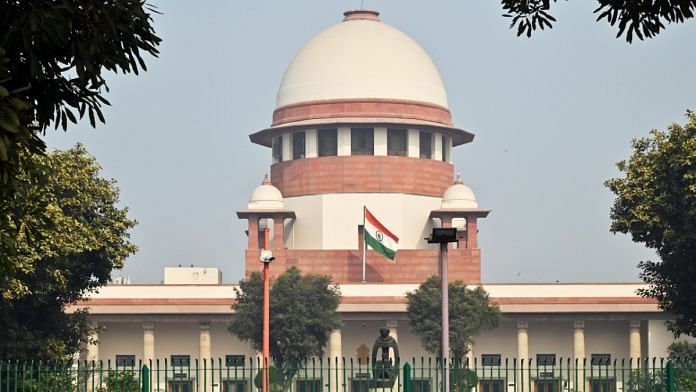New Delhi: The Supreme Court was left surprised Wednesday by Solicitor General Tushar Mehta’s request to refer the 2018 verdict on the dispute between the Delhi government and Lieutenant Governor (LG) – President’s representative in the capital – to a larger bench. A Constitution Bench of five judges had in 2018 held that the LG is bound by the aid and advice of the Council of Ministers and cannot act independently.
A five-judge bench led by Chief Justice D.Y. Chandrachud was hearing Delhi government counsel’s rejoinder regarding who has administrative control over transfers and posting of civil servants in the national capital when Mehta raised the issue of reference.
The solicitor general requested the bench to allow him to file a written note and informed the bench that he had already filed an application, besides arguing the point while making his submissions in the case.
However, a bewildered CJI told him that the bench never heard any arguments on reference.
It was Mehta’s contention that the 2018 judgement interpreting Article 239AA of the Constitution and laying down the powers of the Delhi government was not in consonance with an earlier verdict delivered by a nine-judge SC bench in 1996, which held that Delhi was not on the same footing as a Union Territory. The pending dispute before CJI Chandrachud’s bench is seen as an offshoot arising from the 2018 verdict.
Mehta insisted that the reference is needed and remarked, “We may not be remembered as handing over the national capital to complete anarchy.”
He then asked the bench to grant him permission to file a two-page note.
But the CJI felt that Mehta should have raised the question on reference at the outset of the hearing and not at a time when the opposite party — Delhi government — was in a rejoinder. The Chief Justice also pointed out that arguments in the case would have been over by Tuesday, but the matter was fixed for a hearing Wednesday to allow the Delhi government to submit its rejoinder.
Mehta stood his ground, arguing that the reference is on the grounds that the contours of federalism between Union and Union Territory require a relook. He stated that he was not repeating anything and that his arguments had already covered the reference.
This, however, did not impress the bench. “We would have looked at the matter differently if there was an issue of reference. It was never argued, your side has completed the arguments,” the CJI reminded Mehta.
Mehta made another attempt to convince the bench when senior advocate Abhishek Manu Singhvi commenced his arguments on behalf of the Delhi government in rejoinder. He reminded the bench that when he mentioned the matter before the court, he was told that the reference issue can always be covered later in his arguments.
To this, the CJI said, “But it was not covered in the arguments. That is the point.” Mehta clarified that he did cover the points in his earlier arguments without using the word “reference.”
But this time, Mehta’s request was opposed by Singhvi who said the reference was a “dilatory tactic” adopted by the central government. “This matter had come before the division bench at least 10 times over a year. Not during any time was reference mentioned. Three-and-a-half years after the 2018 judgement…a review of that,” he contended.
Reference, in this context, was mentioned for the first time in December 2022, a few weeks before the final hearing was set to begin, Singhvi recollected. According to him, the reference application is identical to the review petition filed in 2021 against the 2018 judgement which, the senior counsel added, was dismissed.
Refuting Singhvi’s argument, Mehta said, “It can be anything but dilatory. We are dealing with the capital of the nation. My friend is in a tremendous hurry, we may not be remembered as handing over the capital to complete anarchy.”
The court finally allowed Mehta to file a two-page note and circulate it, despite Singhvi’s objection, and reserved its judgement.
(Edited by Amrtansh Arora)
Also Read: What’s Memorandum of Procedure & why it’s at heart of govt-SC tussle over judges’ appointments



